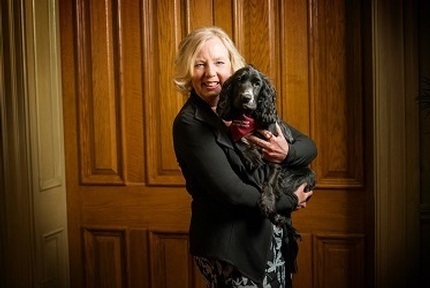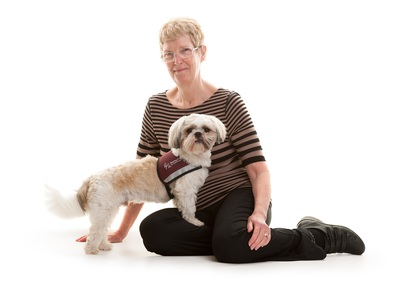BBC Dragon backs charity campaign for Hearing Dogs for Deaf People
Dragons' Den entrepreneur, Deborah Meaden has lent her support to the latest Hearing Dogs for Deaf People campaign to improve access to UK businesses for people with highly-trained assistance dogs.
The campaign was launched after it was revealed that 70 per cent of people who are deaf and have a hearing dog, have been refused access to services on the UK high street.

The charity hopes the new campaign will increase and raise awareness among businesses of their obligation under the Equality Act 2010, to allow disabled people with hearing dogs into their premises.
Ms Meaden said: “Being turned away from a shop or restaurant with a hearing dog can be a humiliating experience, so it is important that businesses are aware of their legal obligation to welcome disabled people with assistance dogs.
“Highly-trained hearing dogs offer a lifeline to deaf people by alerting them to sounds they cannot hear, such as the fire alarm in a public building, or a smoke alarm in the kitchen.
“These intelligent dogs give their owners the support and confidence needed to live an independent life and are easily recognisable by the identifiable jacket and lead slip they wear in public places.”
The survey revealed that business owners have been known to wrongly refuse entry to deaf people with hearing dogs, citing ‘hygiene reasons’, cultural beliefs or a concern that the dog could cause disruption in the business.
The Chartered Institute of Environmental Health revealed that risks associated with dogs posing a hygiene risk or behaving disruptively in public was minimal.
Some 40 per cent of survey respondents said they had been refused access to a business on two or three occasions. While a further 63 per cent said they had been denied access to a restaurant, 54 per cent to a shop, 30 per cent to a café and 23 per cent were refused a taxi.
Chief executive of Hearing Dogs for Deaf People, Michele Jennings, said: “Hundreds of deaf people in the UK rely on their hearing dog to help them every day, and it’s upsetting and degrading when they are turned away from a business.
“Not only do hearing dogs carry out a wide range of practical tasks, but they also provide a deaf person with the support and confidence needed to live an independent life.
“The Equality Act 2010 states that service providers must not treat people with disabilities less favourably if they have an assistance dog, so we want to ensure that all businesses are aware of this.”
Hearing dogs complete 18 months of special training, where they are trained to toilet on command, lie quietly on the floor in cafés and restaurants and taught not to wander around without instruction.

Catherine Broughton, aged 74 is one of the charity’s recipients and has a hearing dog called Beni. Ms Broughton has been denied access to a business on a number of occasions. She said: "Being denied access with Beni brings a mixture of emotions - from shock, disbelief and panic, through to humiliation and helplessness. It is imperative that the quality of life of disabled people with assistance dogs is protected through inclusion and accessibility.
“Occasionally, when I have been turned away from a business, I have been forced to appeal to a higher level of management. This usually brings forth a belated apology, but sadly, there are still some places that I cannot bring myself to revisit.”
For more information as a business or as an assistance dog user, visit: www.hearingdogs.org.uk/access
Latest News
 29-Jul-24
Dementia Bus gives carehome.co.uk staff insight into life with dementia
29-Jul-24
Dementia Bus gives carehome.co.uk staff insight into life with dementia
 01-Mar-24
Find out the top care homes in 2024
01-Mar-24
Find out the top care homes in 2024
 21-Mar-23
UK's top care homes in 2023 revealed
21-Mar-23
UK's top care homes in 2023 revealed
 03-Jan-23
carehome.co.uk launches free care helpline
03-Jan-23
carehome.co.uk launches free care helpline
 13-Dec-22
5 mins with Emily Whitehurst, chief operating officer for Constantia Healthcare
13-Dec-22
5 mins with Emily Whitehurst, chief operating officer for Constantia Healthcare